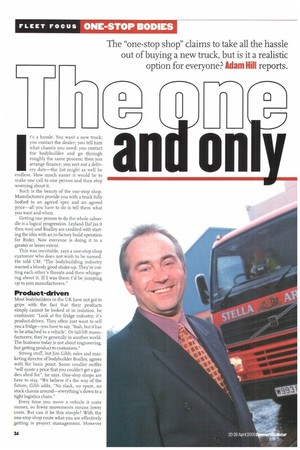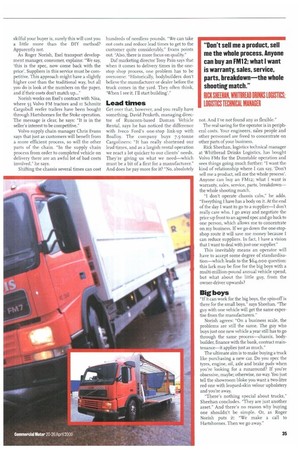The "one-stop shop" claims to take all the hassle out of buying a new thick, but is it a realistic
Page 36

Page 37

If you've noticed an error in this article please click here to report it so we can fix it.
option for everyone? Adam Hill reports.
t's a hassle. You want a new truck; you contact the dealer; you tell him what chassis you need; you contact the bodybuilder and go through roughly the same process; then you arrange finance; you sort out a delivery date—the list might as well be endless. How much easier it would be to make one call to one person and then stop worrying about it.
Such is the beauty of the one-stop shop. Manufacturers provide you with a truck fully bodied to an agreed spec and an agreed price—all you have to do is tell them what you want and when.
Getting one person to do the whole caboodle is a logical progression. Leyland Daf (as it then was) and Boalloy are credited with starting the idea with an in-factory build operation for Ryder. Now everyone is doing it to a greater or lesser extent.
This was inevitable, says a one-stop shop customer who does not wish to be named. He told CM: "The bodybuilding industry wanted a bloody good shake-up. They're cutting each other's throats and then whingeing about it. If I was them I'd be jumping up to join manufacturers:
Product-driven
Most bodybuilders in the UK have not got to grips with the fact that their products simply cannot be looked at in isolation, he continues: "Look at the fridge industry; it's product-driven. They often just want to sell you a fridge—you have to say, 'Yeah, but it has to be attached to a vehicle'. Or tail-lift manufacturers, they're generally in another world. The business today is not about engineering, but getting product to customers."
Strong stuff, but Jim Gibb, sales and marketing director of bodybuilder Boalloy, agrees with the basic point. Some smaller outfits "will quote a price that you couldn't get a garden shed for", he says. One-stop shops are here to stay. "We believe it's the way of the future, Gibb adds. "No slack, no spare, no stock chassis around—everything's down to a tight logistics chain."
Every time you move a vehicle it costs money, so fewer movements means lower costs. But can it be this simple? With the one-stop shop route what you are effectively getting is project management. However skilful your buyer is, surely this will cost you a little more than the DIY method? Apparently not.
As Roger Norish, Exel transport development manager, consumer, explains: "We say, 'this is the spec, now come back with the price'. Suppliers in this service must be competitive. This approach might have a slightly higher cost than the traditional way, but all you do is look at the numbers on the paper, and if their costs don't match up..."
Norish works on Exel's contract with Nisa, where 55 Volvo FM tractors and II Schmitz Cargobull reefer trailers have been bought through Hartshomes for the Stoke operation. The message is clear, he says: "It is in the seller's interest to be competitive."
Volvo supply chain manager Chris Evans says that just as customers will benefit from a more efficient process, so will the other parts of the chain. "In the supply chain process from order to completed vehicle on delivery there are an awful lot of bad costs involved," he says.
Shifting the chassis several times can cost hundreds of needless pounds. "We can take out costs and reduce lead times to get to the customer quite considerably," Evans points out. "Also, there is more focus on quality"
Daf marketing director Tony Pain says that when it comes to delivery times in the onestop shop process, one problem has to be overcome: "Historically, bodybuilders don't believe the manufacturer or dealer before the truck comes in the yard. They often think, When I see it, I'll start building'."
Lead times
Get over that, however, and you really have something. David Penketh, managing director of Runcorn-based Daman Vehicle Rental, says he has noticed the difference with lveco Ford's one-stop link-up with Boalloy. The company buys 7.5-tonne Cargoli ners: "It has really shortened our lead times, and as a largish rental operation we react a lot quicker to our clients' needs. They're giving us what we need—which must be a bit of a first for a manufacturer." And does he pay more for it? "No, absolutely not. And I've not found any as flexible."
The real saving for the operator is in peripheral costs. Your engineers, sales people and other personnel are freed to concentrate on other parts of your business.
Rick Sheehan, logistics technical manager at Whitbread Drinks Logistics, has bought Volvo FMs for the Dunstable operation and sees things going much further; "I want the kind of relationship where I can say, 'Don't sell me a product, sell me the whole process'. Anyone can buy an F11412; what I want is warranty, sales, service, parts, breakdown— the whole shooting match.
"I don't operate chassis cabs," he adds. "Everything I have has a body on it. At the end of the day I want to go to a supplier—I don't really care who. I go away and negotiate the price up front to an agreed spec and go back to one person, which allows me to concentrate on my business. If we go down the one-stopshop route it will save me money because I can reduce suppliers. In fact, I have a vision that I want to deal with just one supplier."
This inevitably means an operator will have to accept some degree of standardisation—which leads to the $64,000 question; this lark may be fine for the big boys with a multi-million-pound annual vehicle spend, but what about the little guy, from the owner-driver upwards?
Big boys
"If it can work for the big boys, the spin-off is there for the small boys," says Sheehan. "The guy with one vehicle will get the same expertise from the manufacturers."
Norish agrees: "On a business scale, the problems are still the same. The guy who buys just one new vehicle a year still has to go through the same process—chassis, bodybuilder, finance with the bank, contract maintenance—it applies just as much."
The ultimate aim is to make buying a truck like purchasing a new car. Do you spec the tyres, engine, oil, axle and brake pads when you're looking for a runaround? If you're obsessive, maybe; otherwise, no way. You just tell the showroom bloke you want a two-litre red one with leopard-skin velour upholstery and you're away.
"There's nothing special about trucks," Sheehan concludes. "They are just another asset." And there's no reason why buying one shouldn't be simple. Or, as Roger Norish puts it: "We make a call to Hartshornes. Then we go away."








































































































